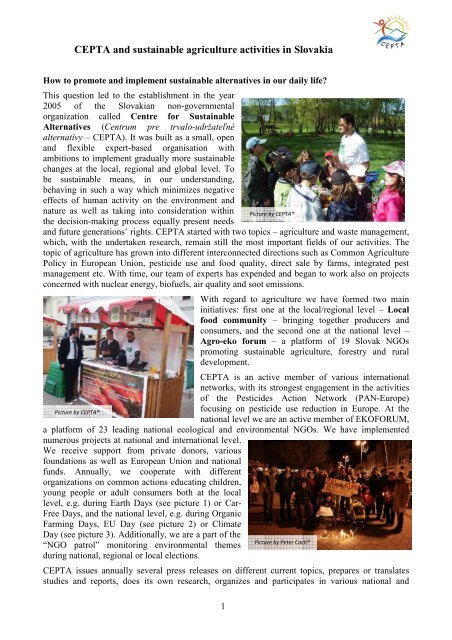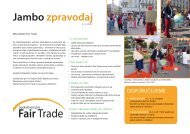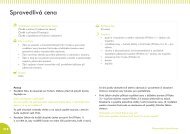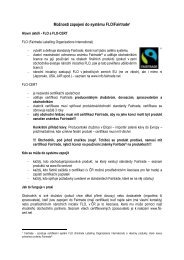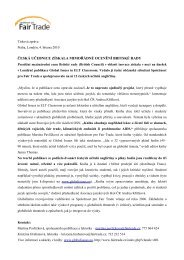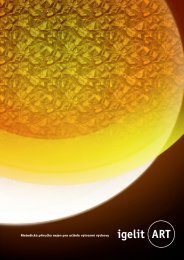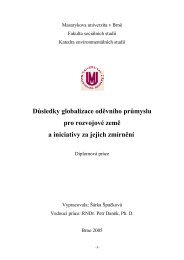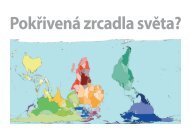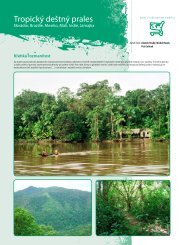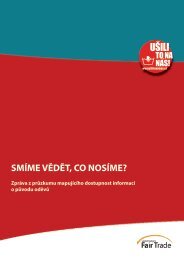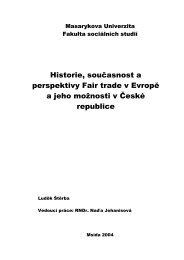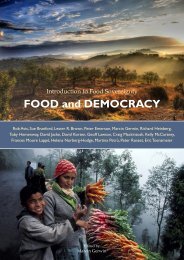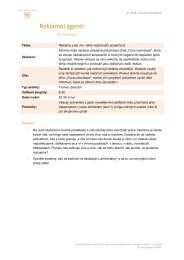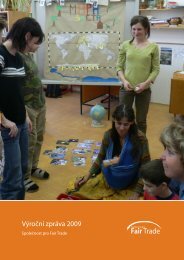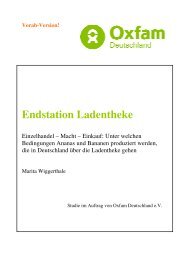CEPTA - CEPTA and sustainable agriculture activities in ... - Fair Trade
CEPTA - CEPTA and sustainable agriculture activities in ... - Fair Trade
CEPTA - CEPTA and sustainable agriculture activities in ... - Fair Trade
Create successful ePaper yourself
Turn your PDF publications into a flip-book with our unique Google optimized e-Paper software.
<strong>CEPTA</strong> <strong>and</strong> <strong>susta<strong>in</strong>able</strong> <strong>agriculture</strong> <strong>activities</strong> <strong>in</strong> Slovakia<br />
How to promote <strong>and</strong> implement <strong>susta<strong>in</strong>able</strong> alternatives <strong>in</strong> our daily life?<br />
This question led to the establishment <strong>in</strong> the year<br />
2005 of the Slovakian non-governmental<br />
organization called Centre for Susta<strong>in</strong>able<br />
Alternatives (Centrum pre trvalo-udržateľné<br />
alternatívy – <strong>CEPTA</strong>). It was built as a small, open<br />
<strong>and</strong> flexible expert-based organisation with<br />
ambitions to implement gradually more <strong>susta<strong>in</strong>able</strong><br />
changes at the local, regional <strong>and</strong> global level. To<br />
be <strong>susta<strong>in</strong>able</strong> means, <strong>in</strong> our underst<strong>and</strong><strong>in</strong>g,<br />
behav<strong>in</strong>g <strong>in</strong> such a way which m<strong>in</strong>imizes negative<br />
effects of human activity on the environment <strong>and</strong><br />
nature as well as tak<strong>in</strong>g <strong>in</strong>to consideration with<strong>in</strong><br />
the decision-mak<strong>in</strong>g process equally present needs<br />
Picture by <strong>CEPTA</strong>®<br />
<strong>and</strong> future generations’ rights. <strong>CEPTA</strong> started with two topics – <strong>agriculture</strong> <strong>and</strong> waste management,<br />
which, with the undertaken research, rema<strong>in</strong> still the most important fields of our <strong>activities</strong>. The<br />
topic of <strong>agriculture</strong> has grown <strong>in</strong>to different <strong>in</strong>terconnected directions such as Common Agriculture<br />
Policy <strong>in</strong> European Union, pesticide use <strong>and</strong> food quality, direct sale by farms, <strong>in</strong>tegrated pest<br />
management etc. With time, our team of experts has expended <strong>and</strong> began to work also on projects<br />
concerned with nuclear energy, biofuels, air quality <strong>and</strong> soot emissions.<br />
Picture by <strong>CEPTA</strong>®<br />
With regard to <strong>agriculture</strong> we have formed two ma<strong>in</strong><br />
<strong>in</strong>itiatives: first one at the local/regional level – Local<br />
food community – br<strong>in</strong>g<strong>in</strong>g together producers <strong>and</strong><br />
consumers, <strong>and</strong> the second one at the national level –<br />
Agro-eko forum – a platform of 19 Slovak NGOs<br />
promot<strong>in</strong>g <strong>susta<strong>in</strong>able</strong> <strong>agriculture</strong>, forestry <strong>and</strong> rural<br />
development.<br />
<strong>CEPTA</strong> is an active member of various <strong>in</strong>ternational<br />
networks, with its strongest engagement <strong>in</strong> the <strong>activities</strong><br />
of the Pesticides Action Network (PAN-Europe)<br />
focus<strong>in</strong>g on pesticide use reduction <strong>in</strong> Europe. At the<br />
national level we are an active member of EKOFORUM,<br />
a platform of 23 lead<strong>in</strong>g national ecological <strong>and</strong> environmental NGOs. We have implemented<br />
numerous projects at national <strong>and</strong> <strong>in</strong>ternational level.<br />
We receive support from private donors, various<br />
foundations as well as European Union <strong>and</strong> national<br />
funds. Annually, we cooperate with different<br />
organizations on common actions educat<strong>in</strong>g children,<br />
young people or adult consumers both at the local<br />
level, e.g. dur<strong>in</strong>g Earth Days (see picture 1) or Car-<br />
Free Days, <strong>and</strong> the national level, e.g. dur<strong>in</strong>g Organic<br />
Farm<strong>in</strong>g Days, EU Day (see picture 2) or Climate<br />
Day (see picture 3). Additionally, we are a part of the<br />
“NGO patrol” monitor<strong>in</strong>g environmental themes<br />
dur<strong>in</strong>g national, regional or local elections.<br />
<strong>CEPTA</strong> issues annually several press releases on different current topics, prepares or translates<br />
studies <strong>and</strong> reports, does its own research, organizes <strong>and</strong> participates <strong>in</strong> various national <strong>and</strong><br />
1<br />
Picture by Peter Coch®
<strong>in</strong>ternational events. In our work we try to have constant contacts with children, young people,<br />
students <strong>and</strong> adult consumers to reflect better their daily problems related to environmental issues.<br />
Susta<strong>in</strong>able <strong>agriculture</strong><br />
The already mentioned Agro-eko<br />
forum (AEF) was created at the end<br />
of 2004 as a national platform<br />
promot<strong>in</strong>g <strong>susta<strong>in</strong>able</strong> <strong>agriculture</strong>,<br />
forestry <strong>and</strong> rural development.<br />
Currently, it consists of 19 members <strong>and</strong> one<br />
associated partner. <strong>CEPTA</strong> has been coord<strong>in</strong>at<strong>in</strong>g<br />
the work of the AEF s<strong>in</strong>ce 2005. The <strong>in</strong>terests of the<br />
AEF members cover a broad spectrum of issues –<br />
from nature protection (e.g. Bird Life Slovakia),<br />
through organic farmers (e.g. EKOTREND –<br />
Association for Organic Farm<strong>in</strong>g <strong>in</strong> Slovakia),<br />
Picture by <strong>CEPTA</strong>®<br />
animal welfare (e.g. Sloboda Zvierat), <strong>susta<strong>in</strong>able</strong><br />
forests (e.g. FSC Slovakia), to local systems <strong>and</strong> rural development (e.g. <strong>susta<strong>in</strong>able</strong> village<br />
Zaježová). There are several reasons why such national coalition was created. First of all, work<strong>in</strong>g<br />
as a group we could become a partner to the M<strong>in</strong>istry for Agriculture, Environment <strong>and</strong> Rural<br />
Development <strong>and</strong> other <strong>in</strong>stitutions, which is of key importance for national policy mak<strong>in</strong>g process.<br />
As Agro-eko forum we have become also a full member of Monitor<strong>in</strong>g Committee for Rural<br />
Development Program for years 2004-2006 <strong>and</strong> 2007-2013. This program divides most of the EU<br />
subsidies <strong>in</strong> <strong>agriculture</strong> <strong>and</strong> thus can be an effective steer<strong>in</strong>g tool for direct<strong>in</strong>g agricultural policy at<br />
the national as well as the EU level. The Monitor<strong>in</strong>g Committee is the only <strong>in</strong>stitution group<strong>in</strong>g<br />
different stakeholders which decides on implementation, changes, monitor<strong>in</strong>g <strong>and</strong> report<strong>in</strong>g of the<br />
Rural Development Program at the national level <strong>in</strong> Slovakia. Secondly, as a group we are a partner<br />
for media <strong>and</strong> we can coord<strong>in</strong>ate our media work to achieve the synergy effect as we share our<br />
knowledge <strong>and</strong> expertise from different po<strong>in</strong>ts of view. F<strong>in</strong>ally, together we can communicate better<br />
common <strong>in</strong>terests of NGOs with<strong>in</strong> national policies <strong>and</strong> control the susta<strong>in</strong>ability element <strong>in</strong> the<br />
<strong>activities</strong> of politicians <strong>and</strong> political parties.<br />
Agriculture <strong>in</strong> Slovakia<br />
The status of <strong>agriculture</strong> <strong>in</strong> Slovakia is not satisfactory but<br />
improv<strong>in</strong>g. Among the issues highlighted by AEF on<br />
different occasions are:<br />
- rural ab<strong>and</strong>onment <strong>and</strong>, <strong>in</strong> effect, a decreas<strong>in</strong>g number<br />
of family farms caused by the loss of work possibilities<br />
<strong>and</strong> social services <strong>in</strong> rural areas (the highest rate of<br />
unemployment is <strong>in</strong> the countryside);<br />
- <strong>in</strong>sufficient food self-sufficiency – Slovakia imports<br />
more than 50% of food which could be produced locally;<br />
- <strong>agriculture</strong> is the biggest source of water pollution,<br />
erosion <strong>and</strong> biodiversity loss <strong>in</strong> Slovakia;<br />
- most food is contam<strong>in</strong>ated dur<strong>in</strong>g the production<br />
process, e.g. by nitrates – fertilizers <strong>and</strong> pesticides<br />
residues which harm consumers’ health;<br />
2<br />
Picture by D. Leš<strong>in</strong>ský®
- beside ma<strong>in</strong>ta<strong>in</strong><strong>in</strong>g the <strong>susta<strong>in</strong>able</strong> production capacity of soil <strong>and</strong> forests, preserv<strong>in</strong>g their various<br />
unique non-production functions, e.g. water catchment <strong>and</strong> filtration, capture of carbon dioxide<br />
(sequestration) etc., are of great value for humans <strong>and</strong> nature.<br />
After the last national elections <strong>and</strong> change of the government <strong>in</strong> July 2010, Agro-eko forum was<br />
asked to prepare the first draft of the new Slovak national agricultural policy. Although the new<br />
government presents a radical positive change <strong>in</strong> the communication style, the M<strong>in</strong>istry of<br />
Agriculture cont<strong>in</strong>ues its <strong>activities</strong> <strong>in</strong> the <strong>in</strong>terests of certa<strong>in</strong> lobby groups, therefore we stay<br />
realistic <strong>and</strong> keep a watchful eye.<br />
Local Food Community <strong>in</strong> Zvolen<br />
At the local level, <strong>in</strong> 2009 <strong>in</strong> the town of Zvolen (central<br />
Slovakia) we started Local Food Community, which reflects<br />
the need to go aga<strong>in</strong>st the current globalisation tendencies.<br />
These tendencies provide us with anonymous, bad quality,<br />
cheap <strong>in</strong> price but environmentally, ecologically <strong>and</strong> socially<br />
expensive food. This dom<strong>in</strong>ant model does not take <strong>in</strong>to<br />
account production potential of regions, but <strong>in</strong>stead creates<br />
grow<strong>in</strong>g dependence of farmers <strong>and</strong> consumers on<br />
supermarket cha<strong>in</strong>s. In Zvolen, we started from a small group<br />
of about 15 consumer-members, mostly young families tak<strong>in</strong>g<br />
Picture by D. Leš<strong>in</strong>ský®<br />
seriously their responsibilities towards nature <strong>and</strong> their<br />
children’s health, <strong>and</strong> 3 producers offer<strong>in</strong>g regional farm products. After one year, without any<br />
advertisement, the community grew to 50 consumer families <strong>and</strong> 7 producers. Annually, the<br />
consumers from the community receive more than one ton of healthy vegetables <strong>and</strong> fruits, milk<br />
products, eggs <strong>and</strong> meat com<strong>in</strong>g from different local/regional farms. This way they support local<br />
economy <strong>and</strong> f<strong>in</strong>ancial stability of farms. The community has a regional approach <strong>and</strong> thus is open<br />
only to people from the region. It has its own “Code of Conduct” which states clear rules for<br />
becom<strong>in</strong>g its member as a consumer or a producer.<br />
The Local Food Community from Zvolen is a member of the European URGENCI network<br />
promot<strong>in</strong>g community supported <strong>agriculture</strong> <strong>and</strong> consumption systems, which are widely know <strong>in</strong><br />
most of the western European countries as CSA or box schemes. Not long ago we organized a visit<br />
of URGENCI representatives <strong>in</strong> Slovakia <strong>and</strong> a visit of 12 Slovak farmers <strong>and</strong> consumers <strong>in</strong> France,<br />
where they visited different farms participat<strong>in</strong>g <strong>in</strong> the system of local food communities called<br />
AMAP, which are already more than 1000 <strong>in</strong> France.<br />
Daniel Leš<strong>in</strong>ský<br />
Centrum pre trvalo-udržateľné alternatívy – <strong>CEPTA</strong><br />
Nográdyho 39<br />
960 01 Zvolen<br />
Slovakia<br />
email: cepta@cepta.sk<br />
tel.: +421 905581076<br />
www.cepta.sk<br />
This article has been produced with the f<strong>in</strong>ancial assistance of the European Union. Its contents are the sole<br />
responsibility of Polish Green Network <strong>and</strong> its partners <strong>and</strong> can <strong>in</strong> no way be taken to reflect the views of the European<br />
Union. The article has been produced also as a part of the project “Central European partnership for <strong>susta<strong>in</strong>able</strong><br />
<strong>agriculture</strong> <strong>and</strong> food sovereignty” co-f<strong>in</strong>anced by the International Visegrad Fund.<br />
3


